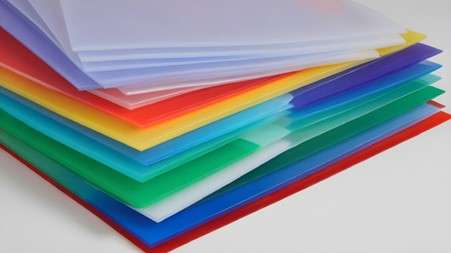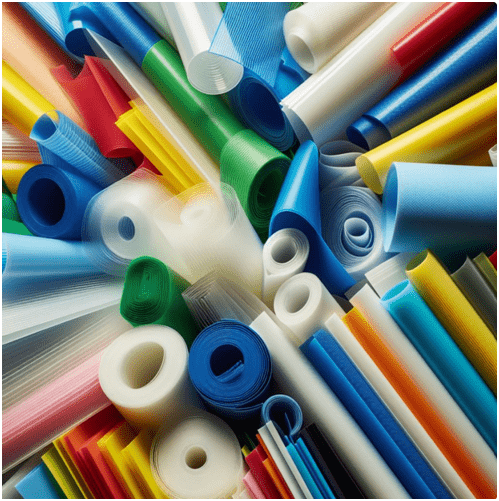Usage / Application
Polypropylene sheets have a wide range of applications across various industries due to their versatile properties. Some common uses include:
Packaging: Polypropylene sheets are widely used in the packaging industry for creating containers, trays, boxes, and blister packs due to their durability, chemical resistance, and ability to be easily formed into different shapes.
Graphic Arts and Signage: These sheets are popular for creating signs, displays, and graphic overlays due to their excellent printability and ability to withstand outdoor conditions.
Stationery and Office Supplies: Polypropylene sheets are used in the production of folders, binders, dividers, and document covers due to their lightweight nature, flexibility, and durability.
Construction and Building Materials: In the construction industry, polypropylene sheets are utilized for applications such as wall cladding, roofing, insulation, and concrete formwork due to their moisture resistance, lightweight, and ease of installation.
Automotive Parts: Polypropylene sheets are used for manufacturing automotive components such as interior trim panels, door liners, battery cases, and bumper fascias due to their impact resistance and ability to withstand harsh environmental conditions.
Medical and Healthcare: These sheets find applications in the medical industry for creating sterile packaging, medical trays, and disposable medical devices due to their chemical resistance and ability to be sterilized.
Agriculture and Horticulture: Polypropylene sheets are used for creating greenhouse coverings, planters, and agricultural mulches due to their ability to withstand UV exposure and moisture.
Food and Beverage Industry: Polypropylene sheets are used for creating food packaging, food containers, and disposable cutlery due to their food-grade compliance, moisture resistance, and ability to be sealed.
Industrial Applications: They are used for various industrial applications such as protective covers, machine guards, and storage bins due to their chemical resistance and durability.
Overall, polypropylene sheets offer a cost-effective solution for a wide range of applications across different industries, thanks to their versatile properties and ease of fabrication
Specifications / Properties
The specifications of polypropylene sheets can vary depending on the manufacturer, intended use, and specific requirements of the application. However, here are some common specifications and properties of polypropylene sheets:
Material: Polypropylene (PP) – a thermoplastic polymer.
Thickness: Typically available in a range of thicknesses, from thin sheets measuring fractions of a millimeter (microns) to thicker sheets measured in millimeters. Common thicknesses include 0.5mm, 1mm, 2mm, 3mm, 4mm, 5mm, and thicker.
Size: Sheets can be produced in various dimensions, including standard sheet sizes (e.g., 4ft x 8ft) or custom sizes tailored to specific requirements.
Color: Polypropylene sheets are available in a variety of colors, including clear/translucent, white, black, red, blue, green, yellow, orange, Natural/Off White and custom colors.
Surface Finish: Depending on the application, polypropylene sheets can have different surface finishes such as smooth, matte, textured, or embossed.
Density: The density of polypropylene sheets typically ranges from 0.89 g/cm³ to 0.91 g/cm³.
Mechanical Properties:
Tensile Strength: Typically ranges from 25 MPa to 40 MPa.
Flexural Strength: Typically ranges from 35 MPa to 50 MPa.
Impact Strength: Polypropylene sheets exhibit good impact resistance.
Hardness: Typically measured on the Shore D scale, ranging from 65 to 75 Shore D.
Chemical Resistance: Polypropylene sheets offer excellent resistance to a wide range of chemicals, acids, bases, and solvents.
Temperature Resistance: Polypropylene has a high melting point, typically around 160-170°C (320-338°F), and can withstand continuous use at temperatures ranging from -10°C to 100°C (14°F to 212°F). However, this can vary based on the specific grade of polypropylene and any additives used.
Flammability: Polypropylene is inherently flame-retardant and has a high ignition temperature. However, additives may be included to enhance flame-retardant properties further.
Environmental Properties: Polypropylene is recyclable and can be produced using recycled materials. It is also resistant to moisture, mold, and mildew.
It’s important to consult the manufacturer or supplier for specific technical data sheets and specifications tailored to your application needs. Additionally, certain additives or modifications may be available to meet particular performance requirements






